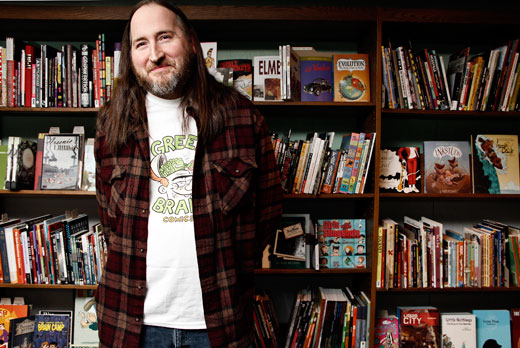The vast majority of reviews for My Friend Dahmer have been off-the-chart rave ones. I have never received this much coverage and acclaim for a book. And for that, I'm both pleased and grateful.
But some reviewers of MFD pick a couple nits. These are mostly blog reviews, not ones from well-known critics. The most common complaint is that I blame adults for not stepping up, but don't own up to my own role in the Dahmer tale. This recent review, for example, takes issue with this:
The question Backderf doesn't seem quite brave enough to address is: "Where were the friends?" He doesn't cover up how he and his friends used Dahmer for their amusement and then ignored him when it suited them, but he doesn't go to the next logical step: what if they'd done something? Said something? Asked an adult to pay attention? He needs to take a harder look at his own role.
What this reviewer writes is true. I didn't say anything. I didn't approach an adult. But how does this reviewer know these things? It's in my book! Harder look? I spell out, with brutal honesty, how I pushed Dahmer away and cut him off, without a second thought or a backward glance. This scene, in particular, is often noted for its callousness:

Look, there are no heroes in this story. It's a tragedy. Everybody fails. But how does the reader know that I and my friends are part of that failure? Because I write it that way! So how is that not owning up to my own role? Hey, I could have made myself look better. Who, after all, would know the difference? A few of my high school friends, perhaps, but no one else. I chose not to do that. Going in to this project, I decided to be as frank and as honest as I could be. That, I think, is why this tales resonates as powerfully as it does.
I also went to great lengths to detail the spirit of the times, since time and place are so crucial to a person becoming who they are, for good or bad. Lev Grossman, the book critic of Time magazine, recognized this and wrote My Friend Dahmer is "like Proust’s madeleine to anybody who was alive in the 1970′s." "Madeleine" is a technique of writing in such a way that it triggers memories in the reader, and thus emotional responses that are attached to those memories. For people who grew up in the Seventies or Eighties, the adolescent world I re-create in MFD will be a very familiar one. For younger readers, that's not the case, but at least they get an accurate portrait of what that world was like, and, more importantly, how vastly it differed from their own.
A central pillar of the tSeventies teenage culture of that era was: you didn't narc on fellow student. Ever. To do so would would make a kid ostracized and shunned and very likely the target of retaliatory beatings. I simply wasn't going to risk that for a guy like Dahmer, someone I really didn't even like by that point. I think I make this very clear in the book. You can't approach this story using the standards of the present day. That is naive. The events of this book took place 35-40 years ago! It was an entirely different world.
I'm also not going retroactively apologize for my actions. Yeah, it was cold, but by the time I distanced myself from Dahmer, all sorts of alarm bells were going off in my head. And you know what? That was a pretty damn good instinct! That could well have been me, cut up in garbage bags in the trunk of Dahmer' car!
I feel that I hit the proper tone with the story. And the vast majority of readers and critics agree. I didn't want to be too obvious and beat the reader over the head. I believe the failure of the adult world, across the board, played a major role in Jeff the lost boy becoming Jeffrey the fiend. Obviously, I got that idea across. Once the adults failed, it fell to me and my friends and fellow classmates to stand up and sound the alarm. We didn't. We passed. And left Jeff behind without a backward glance or the slightest regret. I thought I got across that idea, too.



